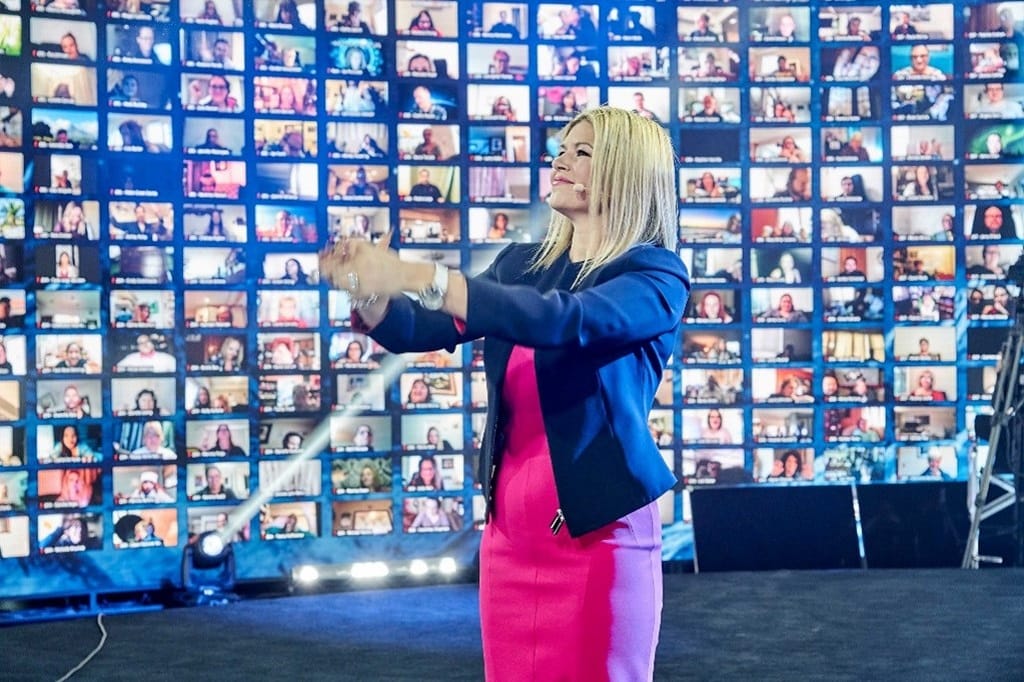Broadband As Civic Infrastructure, Telehealth Under Net Neutrality, Worre Studios Builds Virtual Arena
April 7, 2021 – The German Marshall Fund is calling for broadband to be considered part of the civic infrastructure to draw more public and private partnerships and funding to connect more citizens. Equity issues in communications policy have only worsened during the coronavirus pandemic, and redefi
Derek Shumway

April 7, 2021 – The German Marshall Fund is calling for broadband to be considered part of the civic infrastructure to draw more public and private partnerships and funding to connect more citizens.
Equity issues in communications policy have only worsened during the coronavirus pandemic, and redefining what helps citizens engage with their communities by including broadband to open-up opportunities for long-term success after the pandemic ends is critical, the GMF said in a late-March policy brief.
That includes forming a “digital new deal,” which would see the federal government play a stronger role in financing broadband for public purposes. Such a deal will also require that citizens have digital skills training, tech support, and information literacy to properly prepare for the future.
The government must also demonstrate strong commitment to oversight, enforcement, and assessment of progress toward goals for community connectivity. States also need to have the capacity for broadband planning and the resources to deliver these services via digital platforms, the policy brief states.
Coordinating with the private sector and all levels of government with communities to integrate broadband can create long-term solutions to close the digital divide.
“At a time when the nation faces a crisis of commitment to social and physical infrastructure, access to broadband carries the potential to create opportunities for individuals and communities,” the brief said.
California net neutrality law puts telehealth apps in focus
April 7, 2021 – Critics of California’s new net neutrality law are concerned that a telehealth app that doesn’t count against users’ monthly data allowance may be blocked because of zero-rating provisions in the act, according to Law360, but others say that won’t be the case.
The effective net neutrality law – a justice department legal challenge against which was revoked earlier this year — means internet service providers cannot influence on how traffic moves on their networks, including whether or not an app will be counted against data caps, also known as zero-rating.
In late March, news reports surfaced indicating that officials at the U.S. Department of Veterans Affairs were concerned that VA Video Connect, an app that provides free telehealth services to veterans that doesn’t count against subscribers’ mobile data caps, may be blocked or become no longer supported by ISPs. Republican FCC Commissioner Brendan Carr tweeted on March 24 that, “Cutting off free mental health services for veterans is the unconscionable outcome demanded by regressive ‘net neutrality’ laws. This is wrong.”
AT&T already said it will end sponsored data arrangements nationwide to adhere to the law, to which critics said this could harm veterans struggling to get health care during the pandemic.
Worre Studios Builds Arena To Host Virtual Audience
Worre Studios announced Monday that a 25,000-square-foot circular arena located in Las Vegas, Nevada, that will host thousands of virtual attendees is now open.
Similar to how the NBA has been hosting viewers who are seen in broadcasts, the new studio featured a 360-degree interactive screen that allows a presenter to stand in the middle as if they are performing in front of a large audience.
Virtually every industry has been affected by the Coronavirus in some form or another. The events and entertainment industry lost approximately $30 billion in 2020 due to the pandemic, reported Worre Studios. And no one knows for sure when things will return to “normal,” especially for events. Worre Studios is trying to change that and built a 25,000 square foot circular arena that is designed to host hybrid events. The arena is located in the Southwest part of Las Vegas, Nevada.
The circular screen stage can be used for anything from standard business meetings to live television broadcasts, new product launches, and even live concerts and awards shows. The host or performers can also live interact with digital audience members, which uses Canvas software and Zoom video to connect up to 250,000 live interactive participants, in addition to being spacious enough to fit a 250-person live audience, making it a true hybrid experience.









Member discussion